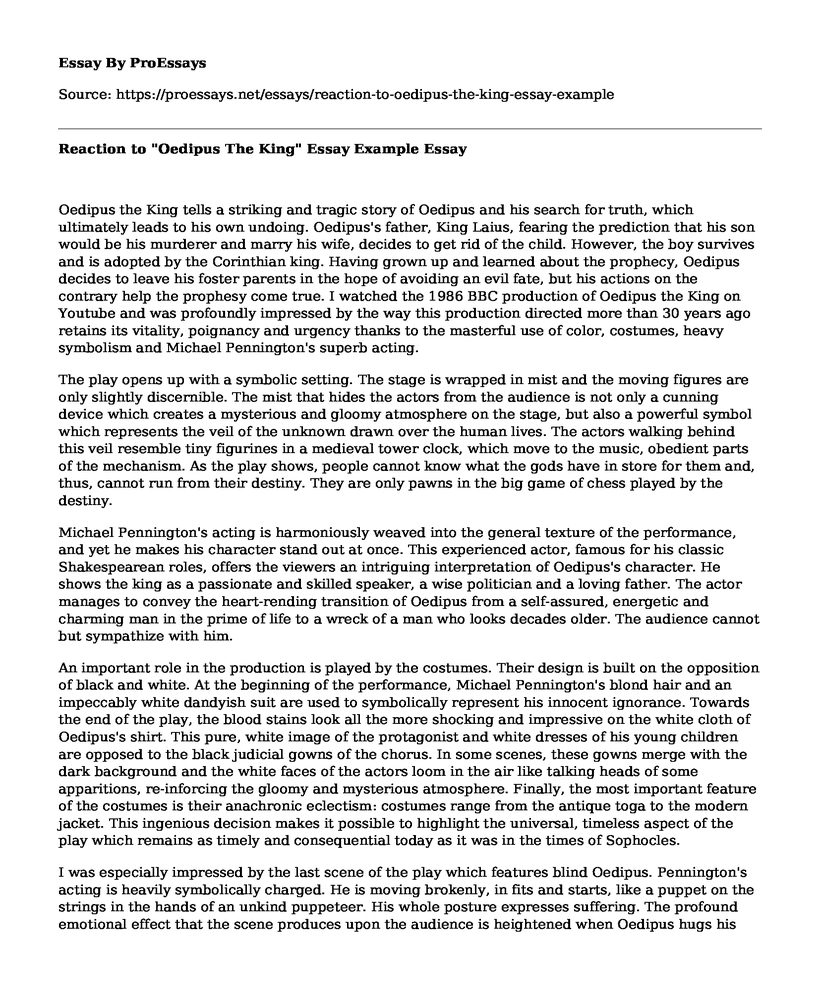Oedipus the King tells a striking and tragic story of Oedipus and his search for truth, which ultimately leads to his own undoing. Oedipus's father, King Laius, fearing the prediction that his son would be his murderer and marry his wife, decides to get rid of the child. However, the boy survives and is adopted by the Corinthian king. Having grown up and learned about the prophecy, Oedipus decides to leave his foster parents in the hope of avoiding an evil fate, but his actions on the contrary help the prophesy come true. I watched the 1986 BBC production of Oedipus the King on Youtube and was profoundly impressed by the way this production directed more than 30 years ago retains its vitality, poignancy and urgency thanks to the masterful use of color, costumes, heavy symbolism and Michael Pennington's superb acting.
The play opens up with a symbolic setting. The stage is wrapped in mist and the moving figures are only slightly discernible. The mist that hides the actors from the audience is not only a cunning device which creates a mysterious and gloomy atmosphere on the stage, but also a powerful symbol which represents the veil of the unknown drawn over the human lives. The actors walking behind this veil resemble tiny figurines in a medieval tower clock, which move to the music, obedient parts of the mechanism. As the play shows, people cannot know what the gods have in store for them and, thus, cannot run from their destiny. They are only pawns in the big game of chess played by the destiny.
Michael Pennington's acting is harmoniously weaved into the general texture of the performance, and yet he makes his character stand out at once. This experienced actor, famous for his classic Shakespearean roles, offers the viewers an intriguing interpretation of Oedipus's character. He shows the king as a passionate and skilled speaker, a wise politician and a loving father. The actor manages to convey the heart-rending transition of Oedipus from a self-assured, energetic and charming man in the prime of life to a wreck of a man who looks decades older. The audience cannot but sympathize with him.
An important role in the production is played by the costumes. Their design is built on the opposition of black and white. At the beginning of the performance, Michael Pennington's blond hair and an impeccably white dandyish suit are used to symbolically represent his innocent ignorance. Towards the end of the play, the blood stains look all the more shocking and impressive on the white cloth of Oedipus's shirt. This pure, white image of the protagonist and white dresses of his young children are opposed to the black judicial gowns of the chorus. In some scenes, these gowns merge with the dark background and the white faces of the actors loom in the air like talking heads of some apparitions, re-inforcing the gloomy and mysterious atmosphere. Finally, the most important feature of the costumes is their anachronic eclectism: costumes range from the antique toga to the modern jacket. This ingenious decision makes it possible to highlight the universal, timeless aspect of the play which remains as timely and consequential today as it was in the times of Sophocles.
I was especially impressed by the last scene of the play which features blind Oedipus. Pennington's acting is heavily symbolically charged. He is moving brokenly, in fits and starts, like a puppet on the strings in the hands of an unkind puppeteer. His whole posture expresses suffering. The profound emotional effect that the scene produces upon the audience is heightened when Oedipus hugs his children, who are frightened and yet fondly cling to their father.
Conclusion
All in all, I believe that though the play dates back to 1986 and has none of the modern technological gimmicks, it is worth watching. It is not very action-packed and some of the scenes are a little dragged out, yet, the suspense is built on the incredible psychological pressure upon the audience and powerful emotional charge of Michael Pennington's acting.
Reference
Taylor, D. (2013, July 25). Oedipus the King. Retrieved February 03, 2019, from https://www.youtube.com/watch?v=3q3ghq5ReLs.
Cite this page
Reaction to "Oedipus The King" Essay Example. (2022, Nov 07). Retrieved from https://proessays.net/essays/reaction-to-oedipus-the-king-essay-example
If you are the original author of this essay and no longer wish to have it published on the ProEssays website, please click below to request its removal:
- A Literary Essay Example: Chivalric Ideals Pursued by Don Quixote
- The Great Gatsby is One of America's Greatest Novel: Literary Analysis Essay
- Young Goodman Brown: Faith vs. Curiosity Essay Example
- Poetry Analysis Essay on "Let America Be America Again"
- The Marrow Thieves: A Dystopian Future of Dreams Lost
- Essay on Hard Times: Sissy's Humble Journey of Kindness and Compassion
- Monkey's Paw Brings Disaster to White Family - Essay Sample







